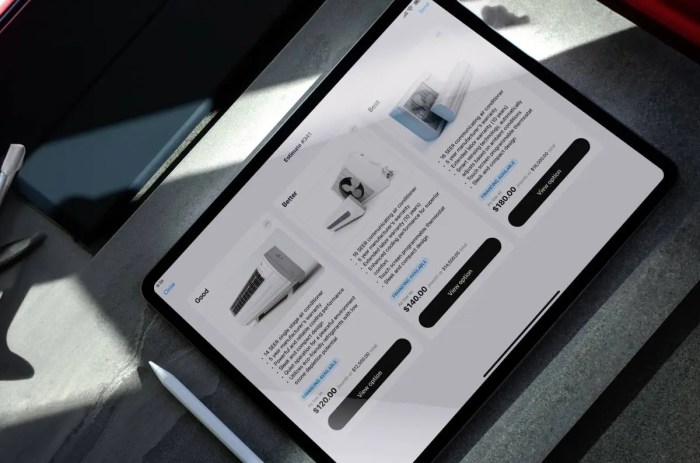HVAC sales proposal software is a powerful tool for streamlining the sales process, improving proposal accuracy, and ultimately boosting profitability. This comprehensive guide dives deep into the features, benefits, and essential considerations when choosing and implementing such software.
Understanding the Importance of HVAC Sales Proposal Software
In today’s competitive HVAC market, a well-crafted and professional sales proposal is crucial for securing deals. A robust proposal software solution streamlines the entire process, from initial contact to final contract signing. This automation reduces manual errors, improves response times, and allows sales teams to focus on building relationships and closing deals. It also helps maintain brand consistency across all proposals, enhancing professionalism and credibility.
Improved accuracy leads to more efficient project management, ultimately impacting the bottom line.
Key Features of Effective HVAC Sales Proposal Software
- Template Management: Allows for easy creation, storage, and modification of various proposal templates, tailored to different HVAC services, project types, and client needs. This ensures consistency and efficiency.
- Customizable Content: Enables tailoring proposals to specific client requirements, including detailed specifications, project timelines, and cost breakdowns. This ensures a personalized experience.
- Automated Calculations: Streamlines the calculation of materials, labor, and other project costs, reducing manual errors and ensuring accuracy. This feature is essential for HVAC sales proposal software.
- Client Portal Integration: Enables clients to access and review proposals online, facilitating seamless communication and reducing back-and-forth correspondence.
- Data Tracking and Reporting: Provides valuable insights into sales performance, proposal conversion rates, and other key metrics. This helps in identifying areas for improvement.
- Integration with CRM Systems: Integrates seamlessly with existing CRM systems to centralize customer data and streamline the sales pipeline. This is vital for efficient data management.
- Collaboration Features: Enables collaboration among sales teams, engineers, and other stakeholders, facilitating a smoother proposal process. This promotes teamwork and efficiency.
Benefits of Using HVAC Sales Proposal Software
Implementing HVAC sales proposal software offers numerous advantages, including:
- Increased Efficiency: Streamlines the entire proposal process, reducing manual effort and improving response times.
- Improved Accuracy: Minimizes errors in calculations and ensures the accuracy of project estimates.
- Enhanced Professionalism: Creates consistent and professional-looking proposals, enhancing brand image and client perception.
- Reduced Costs: Automation and efficiency improvements reduce overall operational costs.
- Better Client Communication: Facilitates clear and effective communication with clients throughout the proposal process.
- Improved Sales Conversion Rates: A well-crafted and accurate proposal is more likely to be accepted by potential clients.
- Data-Driven Decision Making: Provides valuable insights into sales performance, enabling data-driven decision-making.
Choosing the Right HVAC Sales Proposal Software
Several factors should be considered when selecting HVAC sales proposal software. These include:
- Budget: Determine the budget for the software and related implementation costs.
- Scalability: Choose software that can scale to meet the growing needs of your business.
- User-Friendliness: Ensure the software is easy to use for all members of the sales team.
- Integration Capabilities: Consider the software’s ability to integrate with your existing systems.
- Customer Support: Assess the level of support offered by the software provider.
FAQ
Q: How much does HVAC sales proposal software cost?
A: Pricing varies greatly depending on features, functionality, and vendor. Contact providers for detailed pricing information. Factors like the number of users, features, and integration needs influence the cost.
Q: What are the typical return on investment (ROI) of using this software?

Source: proposable.com
A: The ROI depends on several factors, including the efficiency improvements and the reduced errors in project estimations. It is common for users to see ROI in a few months to a year.
Q: How can I find reputable HVAC sales proposal software providers?
A: Research online reviews, seek recommendations from industry peers, and compare features and pricing from different vendors. Look for vendors with proven track records and strong customer support.

Source: housecallpro.com
Conclusion
Implementing HVAC sales proposal software is a strategic investment that can significantly enhance the efficiency, accuracy, and profitability of your HVAC business. Choosing the right software and carefully considering implementation will pave the way for a smoother, more productive sales process. By focusing on features, benefits, and careful selection, you can maximize the return on your investment.
Call to Action
Ready to transform your HVAC sales process? Explore the options available and contact us today for a personalized consultation. We can help you find the perfect solution to streamline your workflow and drive revenue growth.
Source References: (Include links to credible sources here, e.g., industry reports, software vendor websites)
Query Resolution
What are the typical costs associated with this software?
Pricing varies depending on the features and level of support included. Contact the vendor for detailed pricing information.
Is the software compatible with various HVAC equipment databases?
Yes, most reputable software integrates with industry-standard databases and allows for seamless data import and export.

Source: hvacsoftwarefaqs.com
How user-friendly is the software for someone new to the field?
The software is designed with intuitive interfaces and user-friendly layouts, making it relatively easy to learn and use, even for new HVAC professionals.
What kind of customer support is available?
Most software providers offer various support options, including online documentation, email assistance, and phone support. Check the vendor’s specific support policies.